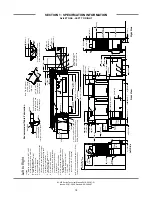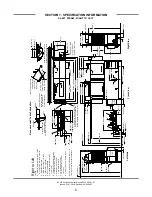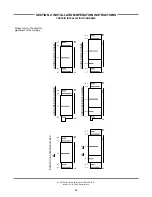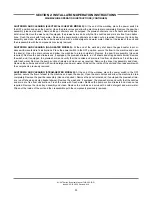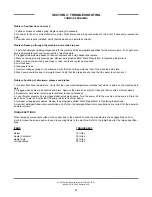
PREPARATION:
Before proceeding with the start-up of the unit, verify the following:
1. Close door(s) on dishmachine.
2. Close the drain valve(s).
POWER UP (ELECTRICALLY-HEATED MODELS):
To energize the unit, turn on the power at the service breaker. The volt-
age should have been previously verified as being correct. If not, the voltage will have to be verified.
POWER UP (GAS-HEATED MODELS):
To energize the unit, turn on the power at the service breaker. The voltage should have
been previously verified as being correct. If not, the voltage will have to be verified. Ensure that the gas service is connected
and that gas is flowing to the machine. Without gas, the water will not reach the required minimum temperatures that the
machine is designed to operate at.
POWER UP (STEAM-HEATED MODELS):
To energize the unit, turn on the power at the service breaker. The voltage should
have been previously verified as being correct. If not, the voltage will have to be verified. Ensure that the steam service is con-
nected and that steam is flowing to the machine. Without steam, the water will not reach the required minimum temperatures
that the machine is designed to operate at.
FILLING THE WASH TUB:
Ensure that the delime switch is in the NORMAL position, and place the power switch into the ON
position. The machine should fill automatically and shut off when the appropriate level is reached (just below the pan strainer).
The wash tub must be completely filled before operating the wash pump to prevent damage to the component. Once the wash
tub is filled, the unit is ready for operation.
Machines equipped with prewash sections should not be run without water in those sections. This can cause
damage to components.
WARE PREPARATION:
Proper preparation of ware will help ensure good results and less re-washes. If not done properly, ware
may not come out clean and the efficiency of the dishmachine will be reduced. It is important to remember that a dishmachine
is not a garbage disposal and that simply throwing unscraped dishes into the machine simply defeats the purpose altogether
of washing the ware. Scraps should be removed from ware prior to being loaded into a rack. Pre-rinsing and pre-soaking are
good ideas, especially for silverware and casserole dishes. Place cups and glasses upside down in racks so that they do not
hold water during the cycle. The dishmachine is meant not only to clean, but to sanitize as well, to destroy all of the bacteria
that could be harmful to human beings. In order to do this, ware must be properly prepared prior to being placed in the machine.
DAILY MACHINE PREPARATION:
Refer to the section entitled “PREPARATION” at the top of this page and follow the instruc-
tions there. Afterwards, check that all of the chemical levels are correct and/or that there is plenty of detergent available for the
expected workload.
WASHING A RACK OF WARE:
To wash a rack, simply slide a rack of soiled ware into the load end of the machine. Once the
the machine is started, it should pull the rack through the machine and push it out the unload end. Once a rack has started
through, you may put another rack in.
OPERATIONAL INSPECTION:
Based upon usage, the pan strainers may become clogged with soil and debris as the work-
day progresses. Operators should regularly inspect the pan strainers to ensure they have not become clogged. If the strainers
do, they will reduce the washing capability of the machine. Instruct operators to clean out the pan strainers at regular intervals
or as required by work load.
NOTE: On units equipped with prewash sections (AJ-66 & AJ-80), operators should also take the time to inspect the prewash
section strainers and clean them as required by workload.
AJ-44T Series Technical Manual 7610-003-07-21
Issued: 03-21-2006 Revised: N/A
SECTION 2: INSTALLATION/OPERATION INSTRUCTIONS
DISHMACHINE OPERATING INSTRUCTIONS
32

